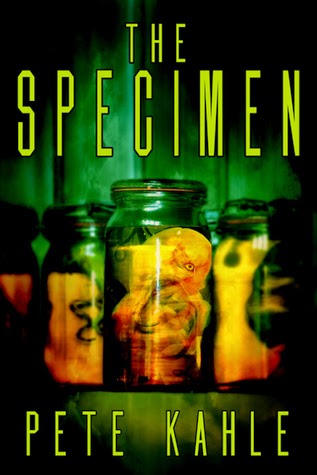Hell's Waiting Room
By C. V. Hunt
Publisher: Grindhouse Press
Pub. Date: October 30, 2014
Rating: 5 out of 5 stars
Greg and his wife live a reclusive life in an isolated house. Greg is none other than bat shit crazy; a survivalist who grows his own food less he is poisoned by the government and rants about the coming invasion. Greg's wife, whose name is part of the mystery of this book, lives in a loveless union in which Greg is at the very least verbally abusive and constantly on the brink of flying into rages. When they experience a power outage, Greg is certain that this is the start of the apocalypse. Almost immediately after, his wife starts to experience strange and terrifying events involving skeletons, her dead parents, and a basement harboring living fetus-like creatures in mason jars. How much of this is really happening in the author's bizarro world and how much is the hallucination and delusions of two dysfunctional people is very much the question. C. V. Hunts leaves us hints throughout and she does a masterful job at feeding us those hints until we reach the satisfying ending.
While Greg is immediately despicable, his wife is an enigma. Not all that likable herself, She seems cowered by him, at first bursting into defiance for moments then falling back in step with his paranoid and verbally abusive demeanor. She seems willing to go along with his most odd demands, like cutting her hair to save on shampoo. Like many dysfunctional relationships, she walks a tight-wire of hate and loyalty. The wife reminds me of many domestic violence victims I have worked with, both aware of the danger of their situation yet invested in the illusion of safety and actually seeking isolation to preserve that illusion. Greg's wife's own experiences strengthens that bizarre "universe" she is trapped in. I can't help comparing this a little to the predicament that the protagonist of The Yellow Wallpaper finds herself in.
Then there is Jean Paul Sartre. The title, Hell's Waiting Room screams No Exit even though the plots are not the same, at least not directly. But there is a clear echo of Sartre's famous warning that "Hell is other people" and maybe, sometimes, hell is ourselves. In some ways, Hell's Waiting Room feels like existentialism gone bad. A world where no real meaning exists except that which you give it yourselves. And if you have a hellish interpretation then reality will be hellish.
I must confess I allowed myself to wander in the abyss of my own interpretation. This has become more of an analysis than a review. Yet that seems to be what Hunt's strange novella is all about. She sets the reader precariously between hallucination and actual disaster and dares us to decide which one it is. Hell's Waiting Room is not a hard read but often an uncomfortable one. I would set it firmly on the shelf that reads "Books I love and hate at the same time" sharing a tenuous friendship with books like American Psycho and We Need to Talk About Kevin. While these books feature unpalatable characters, they speak to our own uncertain grip on reality that can fall apart at any moment. Hell's Waitng Room is that kind of book.





